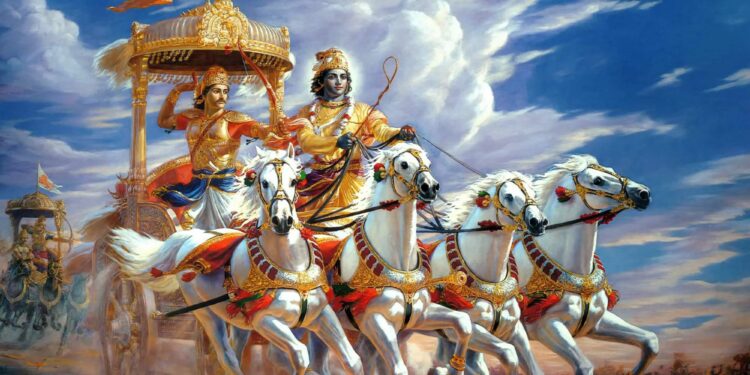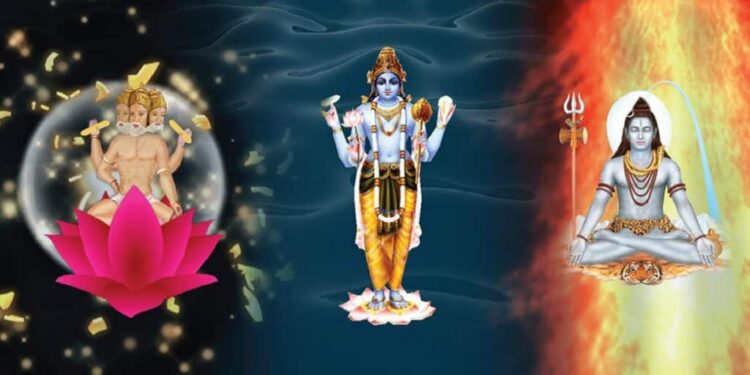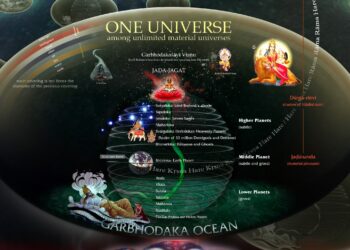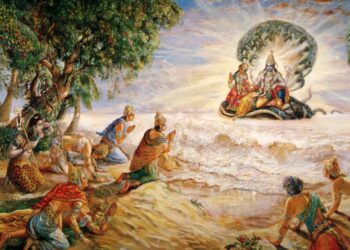TEXT 25
śanaiḥ śanair uparamed
buddhyā dhṛti-gṛhītayā
ātma-saṁsthaṁ manaḥ kṛtvā
na kiñcid api cintayet
SYNONYMS
śanaiḥ—gradually; śanaiḥ—step by step; uparamet—one should hold back; buddhyā—by intelligence; dhṛti-gṛhītayā—carried by conviction; ātma-saṁstham—placed in transcendence; manaḥ—mind; kṛtvā—making; na—not; kiñcit—anything else; api—even; cintayet—should think of.
TRANSLATION
Gradually, step by step, one should become situated in trance by means of intelligence sustained by full conviction, and thus the mind should be fixed on the self alone and should think of nothing else.
PURPORT
By proper conviction and intelligence one should gradually cease sense activities. This is called pratyāhāra. The mind, being controlled by conviction, meditation, and cessation from the senses, should be situated in trance, or samādhi. At that time there is no longer any danger of becoming engaged in the material conception of life. In other words, although one is involved with matter as long as the material body exists, one should not think about sense gratification. One should think of no pleasure aside from the pleasure of the Supreme Self. This state is easily attained by directly practicing Kṛṣṇa consciousness.
TEXT 26
yato yato niścalati
manaś cañcalam asthiram
tatas tato niyamyaitad
ātmany eva vaśaṁ nayet
SYNONYMS
yataḥ yataḥ—wherever; niścalati—becomes verily agitated; manaḥ—the mind; cañcalam—flickering; asthiram—unsteady; tataḥ tataḥ—from there; niyamya—regulating; etat—this; ātmani—in the self; eva—certainly; vaśam—control; nayet—must bring under.
TRANSLATION
From wherever the mind wanders due to its flickering and unsteady nature, one must certainly withdraw it and bring it back under the control of the self.
PURPORT
The nature of the mind is flickering and unsteady. But a self-realized yogī has to control the mind; the mind should not control him. One who controls the mind (and therefore the senses as well) is called gosvāmī, or svāmī, and one who is controlled by the mind is called go-dāsa, or the servant of the senses. A gosvāmī knows the standard of sense happiness. In transcendental sense happiness, the senses are engaged in the service of Hṛṣīkeśa, or the supreme owner of the senses—Kṛṣṇa. Serving Kṛṣṇa with purified senses is called Kṛṣṇa consciousness. That is the way of bringing the senses under full control. What is more, that is the highest perfection of yoga practice.
TEXT 27
praśānta-manasaṁ hy enaṁ
yoginaṁ sukham uttamam
upaiti śānta-rajasaṁ
brahma-bhūtam akalmaṣam
SYNONYMS
praśānta—peaceful, fixed on the lotus feet of Kṛṣṇa; manasam—whose mind; hi—certainly; enam—this; yoginam—yogī; sukham—happiness; uttamam—the highest; upaiti—attains; śānta—rajasam—his passion pacified; brahma-bhūtam—liberation by identification with the Absolute; akalmaṣam—freed from all past sinful reactions.
TRANSLATION
The yogī whose mind is fixed on Me verily attains the highest perfection of transcendental happiness. He is beyond the mode of passion, he realizes his qualitative identity with the Supreme, and thus he is freed from all reactions to past deeds.
PURPORT
Brahma-bhūta is the state of being free from material contamination and situated in the transcendental service of the Lord. Mad-bhaktiṁ labhate parām (Bg. 18.54). One cannot remain in the quality of Brahman, the Absolute, until one’s mind is fixed on the lotus feet of the Lord. Sa vai manaḥ kṛṣṇa-pādāravindayoḥ [SB 9.4.18]. To be always engaged in the transcendental loving service of the Lord, or to remain in Kṛṣṇa consciousness, is to be factually liberated from the mode of passion and all material contamination.



















